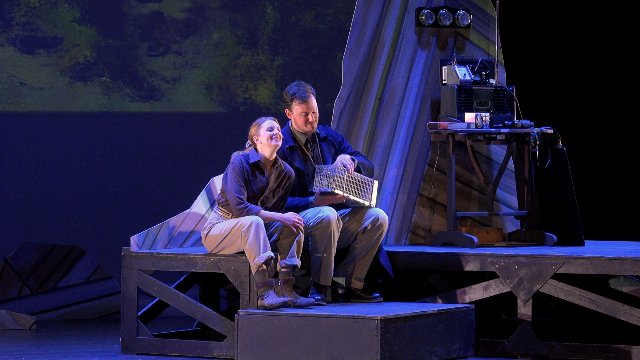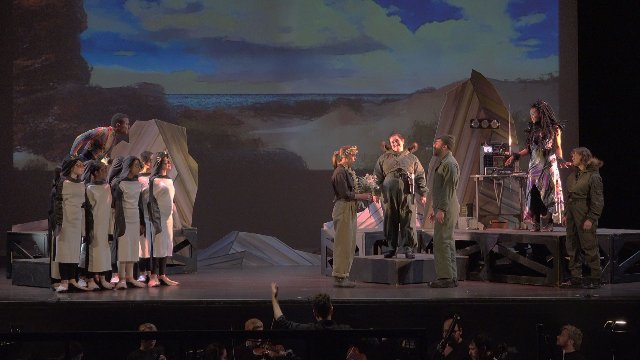Prospero's Island
A Compelling Operatic Update of Shakespeare's "The Tempest"
By: Victor Cordell - Apr 05, 2023
Probably the greatest literary figure of all time, William Shakespeare, has served as a wellspring for opera narratives. Verdi alone created three operatic masterpieces based on Shakespeare plays. In recent times, Thomas Adès composed “The Tempest” with a libretto by Meredith Oakes, which holds closely to The Bard’s storyline, but adapted it to simplified yet poetic modern language.
Composer Allen Shearer and librettist Claudia Stevens have premiered their ninth opera collaboration, “Prospero’s Island,” another borrowing from the “The Tempest.” But they have moved it one measure further from the source material. In addition to lyrics in modern American-English vernacular interspersed with poetic accents, a plot update and revision gives the material more contemporary relevance while altering the moral profile of the main character. The result is a riveting chronicle of moral corruption followed by a quest for redemption that is accompanied by equally compelling music, calling on diverse idioms. Although the narrative arc is clearly dramatic, the creators frequently punctuate the proceedings with humorous interludes.
One way to unfold “Prospero’s Island” is to first contrast it with the original play, “The Tempest.” Perhaps the critical difference is the cause of Prospero’s turpitude. In the play, he is a duke who is wrongfully overthrown, and whatever villainy he displays derives only in consequence. In this opera, he was the (presumably German) Minister of Science, whose weak spine, like many of his passive countrymen during the rise of Nazism, led to his moral downfall. Overall, Shakespeare’s mostly good man has become mostly bad, but in either case, his complexity acts as the bedrock of conflict and contradictions.
In both versions, Prospero escapes to a distant island, but in this opera, the refuge is specific and presumably chosen by the opera creators with intent. It is the Falkland Islands, a British territory nearest to and claimed by Argentina. The presumed reason for the selection is that after World War II, many Nazis absconded to South America, including the nefarious medical experimenter Josef Mengele, perhaps a model for this iteration of Prospero. Another change in the narrative is that Shakespeare’s part-humans, Caliban and Ariel, who would become subservient to Prospero, were native to the island. In Shearer and Stevens’ version, they were created by Prospero.
A final critical difference is that Duke Prospero would return home triumphant. The 20th century Prospero would return to be tried for his crimes.
This operatic update has been set to an eminently approachable and appealing score in Shearer’s very personal, eclectic modern operatic style. Nathaniel Berman conducted the chamber orchestra comprised of 12 instrumentalists. Their rich sound came in large measure from the orchestration which yields the range of timbres of a full orchestra. The composer’s attention to detail is evident in instrumental interplay, but most easily observed in the complexity of the percussion part.
Shearer does not employ leitmotifs liberally, an exception being a slow, rising figure in the French horn and viola indicating Prospero and his power. He does, however, inflect his music to the character’s nature, with the most stylized being Ariel’s music, which is airy, with runs high in the soprano range. Another motif that is vocal rather than orchestral is the high-pitched trills that accompany entrances of the penguin chorus. Yes, you read that right. This reviewer was dubious when learning that penguins would play a role in the opera, but the Falklands is a penguin habitat, and their alteration story (as opposed to creation story) of being taught human attributes by Prospero works well. The birds were eight members of the Grammy-winning San Francisco Girls Chorus, and it was hard not to smile every time they hit the stage with their amusing waddles and clever outfits. Nevertheless, their choral contributions were competent and relevant.
Both score and script swirl with surprise. Interestingly, when script elements shock, darkness tends to prevail, as when daughter Miranda finds a Nazi armband among Prospero’s belongings. When the score jolts, the mood is often lightened, as when two members of the security force looking to arrest Prospero sing a verse of “Cigareets and Whiskey and Wild, Wild Women,” or when the scratchy radio plays “Sweet Georgia Brown,” as if the Harlem Globetrotters were at the door rather than a threat to Prospero’s freedom.
Casting of “Prospero’s Island” was strong, drawing on the Bay Area’s wealth of young talent. Mellow and crisp baritone Andrew Dwan dominates as the contrite but conflicted Prospero. His revealing moment comes near the outset in his well-spun aria when he admits turning a blind eye to the brutality of his work in his homeland. Clear, yet warm voiced soprano Amy Foote portrays daughter Miranda, and conveys her angst as one who has grown up in such isolation that she bemoans “I’m like a slate where little is written. How do I know I’m even pretty?” And as with current political affairs in this country, Miranda must deal with the trauma of her father’s facing a fate that she had never dreamed of.
One of the drawbacks of a 90-minute opera is that it has less time to develop secondary characters, which in this case are Ariel and Caliban. Shawnette Sulker portrays Ariel. Her bright, ringing soprano fits the bird-like quality of Ariel perfectly, and while much of her singing is in bits and starts, several brief poetic texts, including a take on Shakespeare’s “Full fathom five,” are written into her part, which she delivers with alacrity. The grumpy, resentful Caliban is the smooth-toned and rangy baritone Bradley Kynard who nails the role. Although given a grunt and groan personality, he excels in two significant arias of self-loathing over his ugliness and disgusting nature. Declaring himself the wormiest of worms in one, he demonstrates a taxonomy of worms in a funny patter-like treatment.
The production is directed by Philip Lowery, and as with the singers and orchestra, the quality of the staging is impressive. The set is simple, with Prospero’s primitive command and control center being the centerpiece. Otherwise, Jeremy Knight’s often changing backwall projection screen provides context, receiving productive use from the opening fall of the baton as the incoming plane, ablaze, seeks to land. In addition to Costume Designer Joy Graham Korst’s penguin costumes, particularly impressive is the colorful, fanciful attire of Ariel and Caliban.
This opera is highly literate, with deft treatment of the subject matter. Provocative situations arise from the relationships, while ethical and social issues including personal responsibility, loyalty, and abuse abound. “Prospero’s Island” is an enjoyable addition to the composer and librettist’s catalog and should receive further productions.
“Prospero’s Island,” composed by Allen Shearer with libretto by Claudia Stevens, was produced by Ninth Planet and InTandem, and played at Herbst Theatre, in War Memorial Veterans Building, 401 Van Ness Ave., San Francisco, CA in its world premiere on March 25, 2023.






